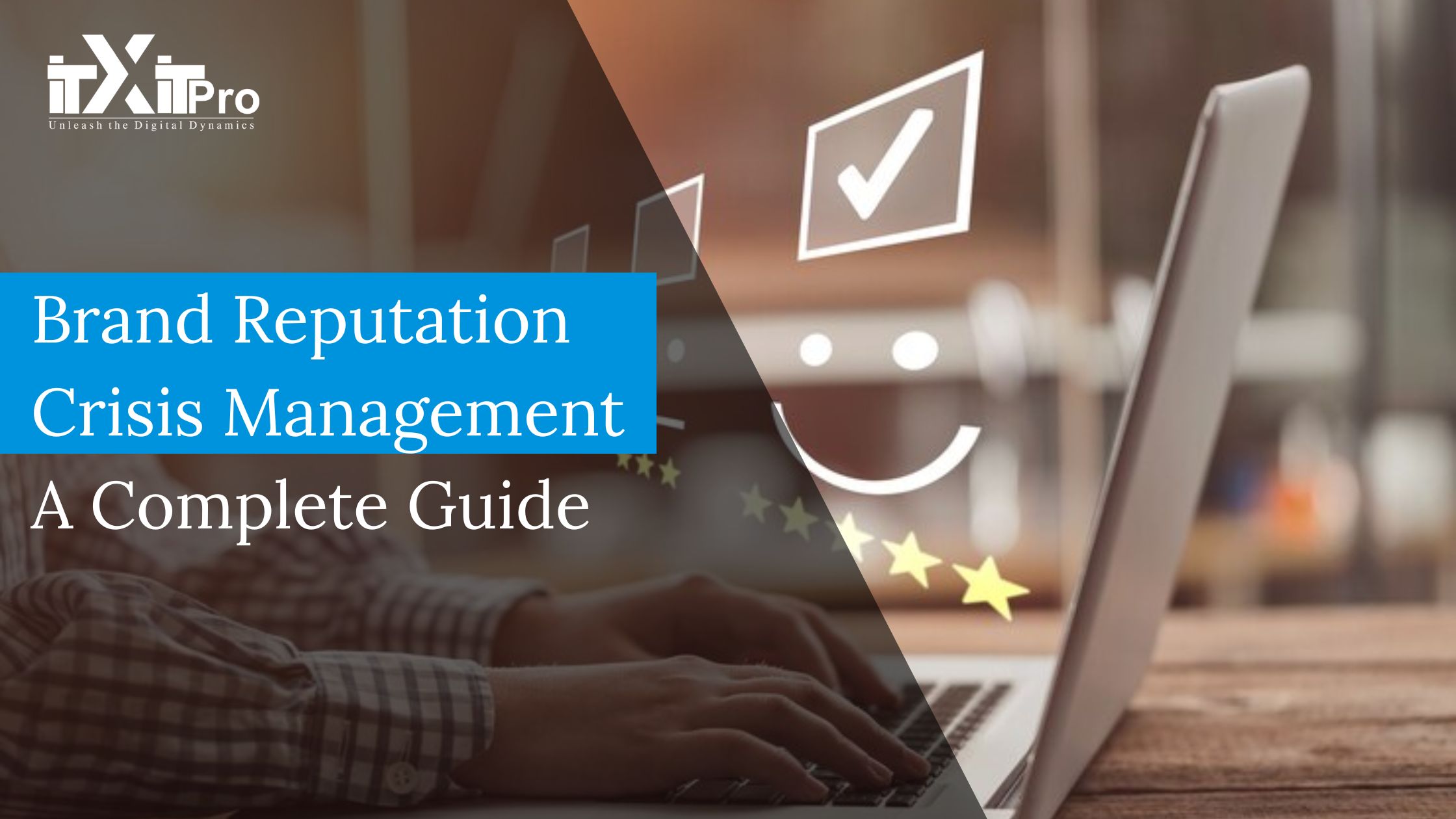
In today’s digital landscape, a brand’s reputation can make or break its success. With social media, online reviews, and news cycles operating at lightning speed, businesses must have a solid plan for managing crises effectively. This guide provides an in-depth look at brand reputation crisis management, including proactive strategies, response tactics, and recovery methods to safeguard your brand’s credibility and ensure long-term trust.
Understanding Brand Reputation Crisis
A brand reputation crisis occurs when negative publicity, customer complaints, or damaging events threaten a company’s public image. These crises can stem from various sources, including product failures, customer service issues, ethical misconduct, or misinformation.
Common Triggers of Brand Reputation Crisis
- Social Media Backlash: Viral posts, negative reviews, or trending hashtags that criticize the brand.
- Product Recalls or Defects: Safety concerns or quality control issues leading to customer dissatisfaction.
- Data Breaches: cybersecurity incidents exposing customer information.
- Employee Misconduct: unethical behavior or controversial statements from company representatives.
- Poor Customer Service: Negative interactions lead to bad word-of-mouth and low ratings.
- Legal Issues: lawsuits, regulatory violations, or compliance failures damaging the brand’s credibility.
- Negative media coverage: Journalistic investigations or exposés highlighting company failures.
Proactive Brand Reputation Management Strategies
1. Monitor Brand Mentions
- Use social listening tools like Google Alerts, Chatmeter, and Cision to track brand conversations.
- Keep an eye on review sites, social media, and news platforms for negative feedback and potential crises.
2. Engage with Customers
- Build strong relationships with your audience by responding promptly to queries and complaints.
- Encourage satisfied customers to leave positive reviews and share their experiences.
- Address negative feedback professionally and empathetically.
3. Implement Strong PR & Crisis Communication Plans
- Have a predefined crisis response plan to handle potential PR disasters effectively.
- Train employees on brand communication, public relations, and crisis management.
- Establish clear protocols for crisis escalation and media response.
4. Transparency and authenticity
- Be open about mistakes and communicate how issues are being resolved.
- Ensure that brand messaging aligns with company values, ethical standards, and customer expectations.
- Maintain consistency in brand communication across all channels.
5. Strengthen Cybersecurity Measures
- Implement robust cybersecurity protocols to prevent data breaches.
- Conduct regular security audits and employee training to mitigate cyber threats.
Steps to Handle a Brand Reputation Crisis
1. Identify the Crisis Early
- Use AI-powered sentiment analysis and media monitoring tools to detect potential crises before they escalate.
- Establish an internal crisis management team responsible for monitoring brand reputation.
2. Assess the Impact
- Determine the severity of the crisis and its potential short-term and long-term effects.
- Identify key stakeholders who may be affected, such as customers, employees, investors, and partners.
- Analyze public sentiment and media response to gauge the crisis’s impact.
3. Craft a Crisis Response Strategy
- Develop a clear and consistent message addressing the crisis.
- Choose the right communication channels (press releases, social media, official website, news outlets) to provide timely updates.
- Have a designated spokesperson to maintain credibility and avoid misinformation.
- Offer solutions and actionable steps to rectify the issue.
4. Take Swift & Decisive Action
- If the crisis involves a mistake, apologize sincerely and outline corrective measures.
- If misinformation is spreading, counter it with factual, transparent communication.
- Engage with affected customers directly to rebuild trust and demonstrate accountability.
- Work with PR professionals and legal teams to mitigate risks and control damage.
5. Monitor and Adapt
- Continuously track public perception and media coverage post-crisis.
- Adjust strategies based on feedback, analytics, and stakeholder insights.
- Conduct internal reviews and post-crisis evaluations to prevent similar incidents in the future.
Case Studies of Effective Brand Reputation Management
1. Johnson & Johnson—Tylenol Crisis
In the 1980s, Johnson & Johnson faced a major crisis when its Tylenol capsules were tampered with. The company immediately recalled the products, launched a safety campaign, and introduced tamper-proof packaging, setting a benchmark for crisis management and consumer safety.
2. KFC: Supply Chain Crisis
When KFC ran out of chicken in the UK due to supply chain issues, the brand responded with humour and transparency. They released a clever advertisement acknowledging the problem, took immediate steps to resolve the issue, and maintained customer loyalty through open communication.
3. Starbucks: Racial Bias Incident
Following a controversial racial profiling incident, Starbucks quickly took responsibility, shut down stores for nationwide racial bias training, and reinforced its commitment to diversity and inclusion. This proactive response helped restore public confidence in the brand.
Recovering & Rebuilding Brand Reputation Post-Crisis
1. Reaffirm Brand Values
- Reiterate company mission and ethics through marketing, PR efforts, and corporate initiatives.
- Publicly commit to better policies, customer service improvements, or corporate social responsibility (CSR) programs.
2. Engage in Corporate Social Responsibility (CSR)
- Contribute to charitable causes, sustainability efforts, or community initiatives to improve public perception.
- Partner with non-profit organisations or industry leaders to showcase responsible business practices.
3. Improve internal policies and training
- Conduct workshops and employee training to prevent future crises.
- Strengthen internal communication, customer service, and compliance protocols.
- Develop a culture of ethical business practices and accountability.
4. Leverage Positive PR and influencers
- Partner with influencers, brand ambassadors, or media outlets to reshape brand perception positively.
- Highlight success stories, customer testimonials, and business achievements to rebuild trust.
- Launch reputation recovery campaigns to reinforce credibility and market positioning.
Conclusion
A brand reputation crisis can be challenging, but with a well-executed strategy, businesses can not only recover but emerge stronger. By proactively managing brand perception, addressing crises with transparency, and taking corrective action, companies can protect their credibility, rebuild trust, and maintain long-term customer loyalty.
Being prepared, responding swiftly, and learning from past crises are key to maintaining a resilient and reputable brand in today’s competitive market.
The Role of Online Reputation Management Services in Preventing and Controlling Crises
When a brand’s image is at stake, having a reliable online reputation management service is no longer optional — it’s essential. These services go beyond just damage control; they proactively monitor brand mentions across review sites, forums, news portals, and social media platforms to catch negative sentiment before it escalates into a full-blown crisis. Agencies offering digital marketing services typically integrate ORM strategies into their core offerings — ensuring your brand narrative stays positive across Google search results and social platforms. During a crisis, ORM professionals help suppress harmful content through SEO tactics, publish clarifying or apology statements, and push fresh, trust-building content that aligns with brand values. This approach doesn’t just defend your reputation; it positions your business for long-term resilience.
Why Social Media Marketing Services Are Essential in Crisis Communication
In today’s hyper-connected world, your brand’s reputation can be significantly influenced — or redeemed — by how it behaves on social media during a crisis. A well-structured social media marketing service ensures your team is ready to respond in real-time with empathy, clarity, and confidence. Social media is often where crises break and where they get resolved. Delays or missteps in communication can worsen public backlash, whereas prompt responses and transparency can turn negative sentiment into support. A full-service digital marketing service agency will typically build a social media crisis playbook that includes escalation protocols, message templates, and a monitoring dashboard. Whether it’s addressing complaints, correcting misinformation, or issuing apologies, a skilled social media team can significantly influence public perception in your brand’s favor.
FAQs
1. What is a brand reputation crisis?
A brand reputation crisis occurs when negative publicity, customer complaints, or scandals damage a company’s public image, leading to loss of trust and potential financial impact.
2. What are the common causes of a brand reputation crisis?
A brand reputation crisis can be triggered by factors such as poor customer service, negative reviews, cybersecurity breaches, misleading advertising, unethical business practices, or social media backlash.
3. How can businesses detect an upcoming reputation crisis?
Monitoring brand mentions on social media, tracking online reviews, and using sentiment analysis tools can help businesses identify early signs of a potential crisis.
4. What are the first steps to take during a reputation crisis?
The first steps include acknowledging the issue, assessing its impact, issuing a transparent public response, and taking corrective actions to rebuild trust.
5. How can a business recover from a reputation crisis?
Recovery involves clear communication, addressing customer concerns, improving internal processes, strengthening security measures, and leveraging PR strategies to restore credibility.
6. How important is social media in reputation management?
Social media plays a crucial role in reputation management as it amplifies customer feedback, influences public perception, and allows businesses to respond promptly to crises.
7. Can SEO help in brand reputation management?
Yes, SEO can help by pushing positive content higher in search results, addressing negative search visibility, and improving overall brand perception online.
8. What role does crisis communication play in reputation management?
Crisis communication ensures that businesses provide timely, honest, and consistent messaging to customers, stakeholders, and the media to prevent misinformation and restore trust.
9. How can companies prevent a brand reputation crisis?
Prevention strategies include proactive reputation monitoring, maintaining ethical business practices, providing excellent customer service, and having a crisis response plan in place.
10. How long does it take to recover from a brand reputation crisis?
Recovery time varies depending on the severity of the crisis, but consistent damage control efforts, transparency, and positive engagement can help rebuild reputation faster.
11. How can we differentiate between a minor issue and a full-blown crisis?
A minor issue might involve isolated negative feedback, while a full-blown crisis typically garners widespread public attention, significant media coverage, or viral social media traction. Monitoring tools and sentiment analysis can help gauge the severity and scope of the situation.
12. What role does employee behavior play in brand reputation?
Employees are brand ambassadors. Their actions, both online and offline, can significantly impact public perception. Implementing clear social media policies and regular training can ensure employees represent the brand positively.
13. How can we use SEO to mitigate negative press?
By creating and promoting positive content, optimizing for relevant keywords, and building authoritative backlinks, businesses can push down negative search results, ensuring that favorable content ranks higher
14. Is it advisable to engage with trolls or negative commenters online?
Engaging with genuine customer concerns is essential. However, trolls often seek attention without constructive intent. It’s best to address valid criticisms professionally and avoid feeding into unproductive exchanges
15. How often should we review and update our crisis management plan?
Regular reviews, at least bi-annually, are recommended. However, after any significant organizational change or post-crisis, immediate updates should be made to address new potential vulnerabilities.
16. Can influencer partnerships help in rebuilding brand trust post-crisis?
Yes, collaborating with trusted influencers can humanize the brand and convey authenticity. Their endorsement can reassure audiences, provided the partnership aligns with the brand’s values and the influencer’s audience.
17. How do we measure the effectiveness of our crisis response?
Key performance indicators include sentiment analysis, media coverage tone, customer feedback, and changes in sales or engagement metrics. Regularly monitoring these can provide insights into the response’s impact.
18. Should we issue a public apology even if we’re not at fault?
While taking responsibility is crucial, it’s essential to ensure that any apology is genuine and warranted. If the brand isn’t at fault, expressing empathy and a commitment to resolution without admitting blame is a balanced approach.
19. How can we prepare our customer service team for potential crises?
Regular training sessions, clear communication protocols, and providing them with up-to-date information ensure they can handle inquiries confidently and consistently during crises.
20.What platforms are most effective for crisis communication?
The choice depends on where your audience is most active. Typically, a combination of official press releases, social media updates, and website announcements ensures broad and effective communication.















